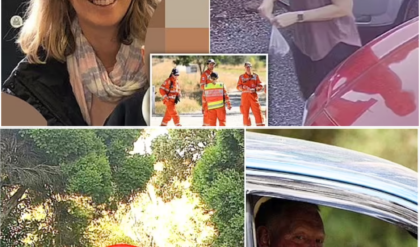Emily Watson, Olivia Williams and Mark Strong lead the cast of a sci-fi drama set over 10,000 years before the events of the Denis Villeneuve-directed movies.

Emily Watson, Olivia Williams in Dune: Prophecy Attila Szvacsek/HBO
When it premieres on HBO Sunday, Nov. 17, Dune: Prophecy will take the place of The Penguin on the schedule. It’ll also continue the premium cable giant’s recent run of odd corporate integration, in which it takes blockbuster Warner Bros. film franchises and retrofits them as new television versions of popular HBO series.
Just as the creative team behind The Penguin looked at the opportunity to do a standalone show focused on Colin Farrell’s waddling crime lord and delivered The Sopranos with more latex, the developers of Dune: Prophecy apparently looked at the opportunity to do a prequel tied to Denis Villeneuve’s Dune and delivered House of the Dragon with (a very few) sandworms in place of (an awful lot of) dragons.
I’m not saying that when HBO’s Harry Potter series finally emerges from its endless gestation, it will be a stealth reboot of Arli$$. But I’m not not saying that.
Excessive familiarity aside, The Penguin wasn’t bad, with Cristin Milioti’s performance serving as its primary draw. Nothing in Dune: Prophecy rises to a Miliotian (trademark pending) level of greatness, and the show fails to live up to most of what is so technically astonishing about the Villeneuve films. But as an overstuffed meditation on the struggles of female agency in a patriarchal society — one in which names like “Harkonnen” and “Atreides” are occasionally tossed around to pander to an imagined base — it offers moments of handsomely produced, morally murky scheming and backstabbing.
Adapted by Diane Ademu-John and Alison Schapker, Dune: Prophecy is ostensibly an elaborate origin story for the Bene Gesserit, the franchise’s influential sisterhood, though it’s only somewhat based on the novel Sisterhood of Dune. The general foundation is exhaustively set with roughly four minutes of voiceover from Valya Harkonnen (Emily Watson, plus Jessica Barden in frequent flashbacks), whose goal is to use the power of the Sisterhood — and the powers of the Sisterhood, since you may remember that members of the Bene Gesserit are able to do lots of supernatural things — to achieve some level of galactic control and to help restore her family’s good name.
It’s established in those opening minutes that Valya did a very bad thing and, as she admits, “I knew then, the name Valya Harkonnen would forever be damned to the wrong side of history.” But was the bad thing done for good reasons? Or is there no such thing as a good reason to do ambitious things in the name of power? And is it perceived differently when women do those things instead of men? Good questions!
Valya most trusted sidekick is her sister Tula (Olivia Williams, plus Emma Canning as a younger woman). They’re overseeing an entire school of novices or acolytes or whatever, from whose ranks we meet a few, including martyrdom-obsessed Sister Emeline (Aoife Hinds), antiauthoritarian Sister Jen (Faoileann Cunningham), secretly gifted Sister Theodosia (Jade Anouka) and youthful Sister Lila (Chloe Lea), who may be the most remarkable of all.
The Sisterhood is about to add some status in the form of Emperor Javicco Corrino’s (Mark Strong) daughter, Princess Ynez (Sarah-Sofie Boussnina), who hopes to dabble in Truthsaying — the Sisterhood’s initial primary ability is that they’re trained to be human lie detectors — while waiting for her arranged husband to come of age. But things are about to go topsy-turvy at the royal palace, with the arrival of soldier Desmond Hart (Travis Fimmel), the only survivor of a spice harvesting disaster down on Arrakis.
What ensues is something of a game of thrones, so to speak, as the emperor, the Sisterhood, several ancient families and the enigmatic Desmond all start to make moves in hopes of controlling the Imperium and the flow of spice. Because as Posh, Ginger, Sporty, Baby and Scary — the Bene Gesserit of ’90s pop music — once sang, “People of the world, spice up your life!”
There’s a very real sense that somebody cut and pasted lines of dialogue from a Game of Thrones template script and just added the word “spice” at random intervals like, “We are all just pieces on the board, to be played in the pursuit of power and spice” or “Ho-spice-dor.”
The story is set some 10,148 years before the birth of Paul Atreides — a far larger gulf than in similar current prequel series like House of the Dragon or Amazon’s Lord of the Rings thing — and it’s mostly set on planets that aren’t Arrakis, so don’t expect many direct connections to the Villeneuve films. Which factions will ascend to power many millennia later isn’t much relevant here, but the drama underlines the core characteristics of its famous families as they play games with each other’s lives, make tenuous alliances, execute heartbreaking betrayals and engage in schemes and counter-schemes, all infused with a moral ambiguity which, honestly, leaves the whole series a thematic mess.
I get “ambition is dangerous” and “absolute power corrupts absolutely” and “religious zealotry is scary.” But any takeaway that might make the narrative more timely, like about the threat of powerful women in a post-Kamala universe or the encroaching dangers of artificial intelligence, tends to be contradictory.
Still, this is clearly a chance for some world-building that, despite a combined running time of over five and a half hours, Villeneuve’s features could not approach. Dune: Prophecy is no slouch in the running time department, either. Each of the four episodes sent to critics exceeds an hour, which is too much, but is at least enough for a whole lot of context into the war with “thinking machines,” the political structure of the Imperium and the origins of elements from later in the plot, like the Voice.
The very real question of whether viewers actually want all of that context may be answered in the negative by those who enjoyed the movies for the epic visuals achieved by Villeneuve and cinematographer Greig Fraser. Though the first picture does not want for spectacle, the sequel in particular is as expansive and vast as any theatrical experience in decades.
Dune: Prophecy is not that. It is dark, gloomy and, despite the size of some of the palaces, citadels and whatnot, frequently claustrophobic. The endless horizons and undulating dunes of the films are replaced with twisty hallways, perplexing catacombs and smoky spice hookah parlors. This is fully intentional, offering both aesthetic contrast within the storytelling and, presumably, a more manageable budget. But however by-design it is, there’s a difference between “jaw-dropping” and “generally well-produced.”
And this isn’t just a movies versus TV thing. There’s a gap between Pierre Gill and company’s photography and the varied sets delivered by production designer Tom Meyer in Dune: Prophecy, and something like Foundation or Silo on Apple TV+, which represent the current peaks of the medium’s current cinematography, effects and set design. On a practical level, the Dune: Prophecy directors, starting with Anna Foerster, are more invested in the contours of the actors’ faces than in whatever was set up on a soundstage in Budapest.
The double-casting of Watson/Barden and Williams/Canning is the center of the show, and all four actresses are excellent and impeccably on the same page in their characterizations. My favorite of the early installments was the flashback-heavy, genuinely twisty third, with Barden and Canning in the spotlight. That was the only episode to include anything that made me genuinely surprised.
Among the familiar veteran actors, Strong is a savvy choice to play an emperor who conveys the appearance of domineering authority, but is being pushed around this chessboard by his wife Natalya (Jodhi May) and possibly by Desmond, a part that lets Fimmel supply his usual mixture of movie star charisma and character actor weirdness.
As long as the chapters are, so far there hasn’t been enough time for the younger actors to really stand out as individuals. Notwithstanding an helpful expositional sequence in which Valya and Tula look at pictures of each acolyte and debate their pros and cons, very few of their personalities are really distinctive or consistent.
I spent most of my time scratching my head about what the show wants to tell us about Princess Ynez and whether or not Boussnina, who seems far older than the character is supposed to be, was simply miscast. She’s stuck in the least interesting side of the story, with an extremely bland love interest, Keiran (Chris Mason), who would be completely forgettable if his last name weren’t “Atreides,” and a dreamy half-brother, Constantine (Josh Heuston), who contributes Game of Thrones-y discussion about legitimacy in royal bloodlines and gets to be part of the season’s one extremely gratuitous and extremely Game of Thrones-y sex scene so far.
Even though it’s part of a brand, Dune: Prophecy has lots of elements to introduce, and the series is already a slow, sometimes lugubrious build. But I found myself becoming increasingly invested as it went along. Maybe by the end of the first season, I’ll be hooked. As of now, though, everything could use just a bit more spice.




